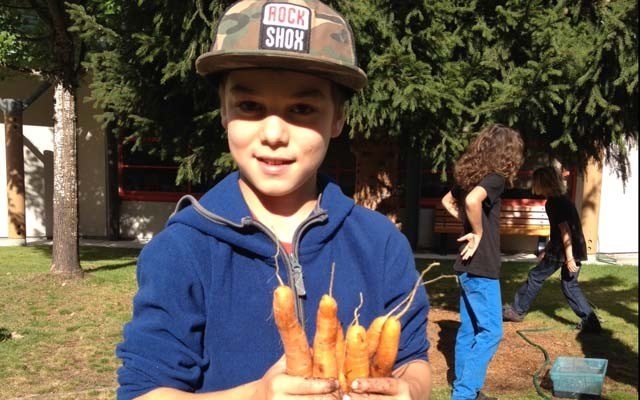One carrot can change everything.
The students at Myrtle Philip Community School discovered that recently as part of The Garden Project. In the spring, all 330 students helped plant vegetables and pollinators in plots around the school and when they returned in the fall to harvest them, got to sample their bounty.
"The class that planted the carrots harvested all the carrots and washed them off. They set out in front of their classroom samples of all of the things that they had grown in their garden," said Grade 4/5 teacher Jennifer Black. "Everyone got to take a carrot and munch on a beautiful, sweet, fresh-out-of-the-garden carrot.
"The reaction to eating the carrot, it was like they'd never eaten a carrot before in their life. Because of all the build-up and excitement and their involvement, they were saying 'Oh my goodness, this is the best carrot I've ever had. It tastes like candy!'"
The kids will get to enjoy all the vegetables combined this Friday, Oct. 7 over lunch when they get to slurp soup chockfull of good eats from their very own gardens.
Parent leader Christy Craig said the feast would help all the project's lessons truly hit home for the youngsters.
"To me, it's really the important step because when I started the project, I wanted it to be complete — to grow the food, harvest it and actually be able to cook with it. It's not like an unfinished science experiment. We are actually completing the task," she said. "It's been a long time coming. It's a year in the making."
Some of the older pupils at the school will continue to be involved, as students in Grade 4 and up will help chop the vegetables and Grade 6 and 7 students will serve soup to the younger children.
"It'll be a wonderful experience with the older kids welcoming the younger kids," Craig said.
"The kids are in charge of setting up the tables and the older students are going to be serving the lunch to the younger kids," Black added.
The hope is to hold the long-table lunch outside with three shifts of diners, but the school's gymnasium has been reserved as a backup plan if the weather doesn't cooperate.
The Hilton Whistler was a booster for the project, providing the soup stock and dinner rolls for the meal, as well as tablecloths to add a classy touch to the proceedings,
One major point both Craig and Black hope to bring to the kids is delicious and nutritious food needn't come from halfway across the world. Craig, a Pemberton resident, said people there are plugged in to the farming community while there seems to be a disconnect in Whistler.
For her part, Black said she's already seen some headway made in that regard.
"There seems to be a greater understanding that the food we get at Nesters or IGA actually can be grown in our garden in this part of the world," Black said. "There seems to be a higher level of engagement in growing things in our own backyard."
Craig, too, has hope that she's helped raise a generation of small-scale gardeners and farmers, at least from what she's observed in the harvesting process.
"I was getting them to try the food as we were harvesting it and we were getting comments: 'This is the best celery I've ever eaten.' Some kids have never had raw zucchini before and they said 'Oh, I want to grow this at my house,'" she said. "I feel like it's making an impact on them."
As well, all students must bring in their own bowl and spoon to hold their soup as Craig looks to spread a message of the importance of sustainability.
"Just like growing your own food is good for the environment because you're cutting down on the travelling of the food, I really want to encourage people to move away from using single-use containers. It's not sustainable and everywhere we go, you get your coffee in a to-go cup," she said. "This is really encouraging responsibility of the kids to have to remember that and is also showing them that this should be the norm."
Black said her Grade 4 and 5 class planted tomatoes, which ended up as a "bumper crop," as well as celery, a little bit of kale, and one failure — basil — which she said ended up being valuable for the kids.
"That was a cool experiment for the kids to see, that some things are much hardier and some are more fragile and what caused that to not happen," she said.




